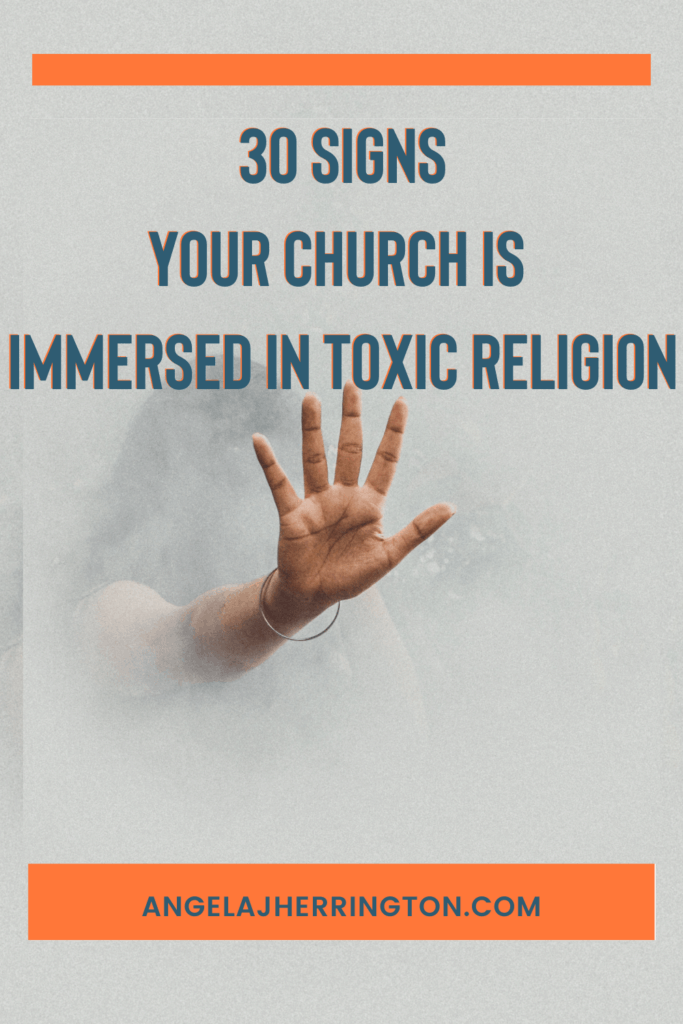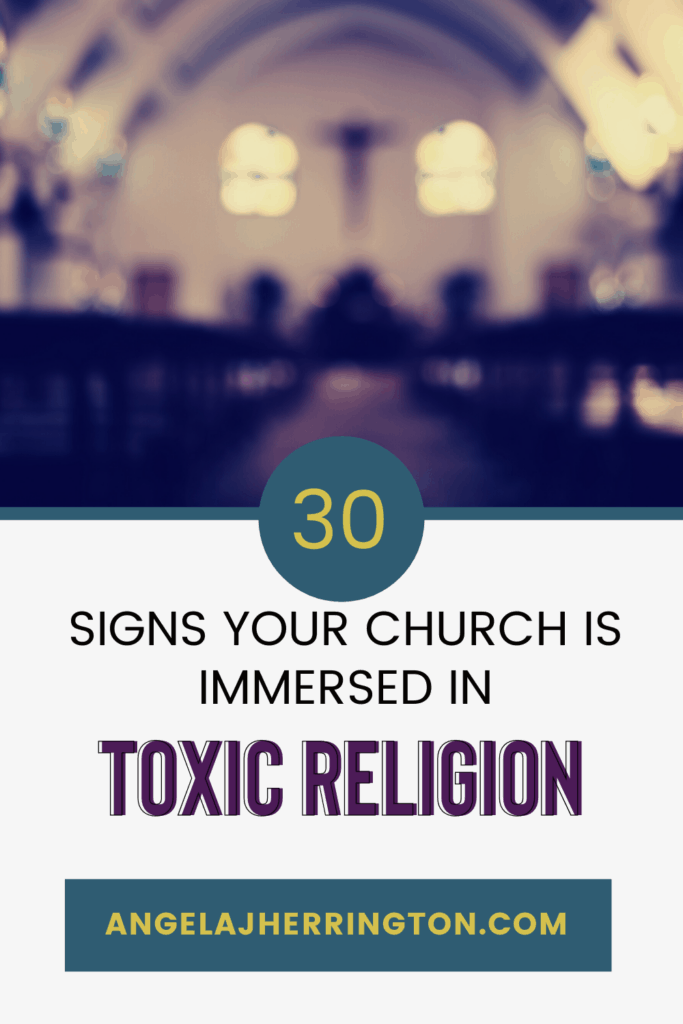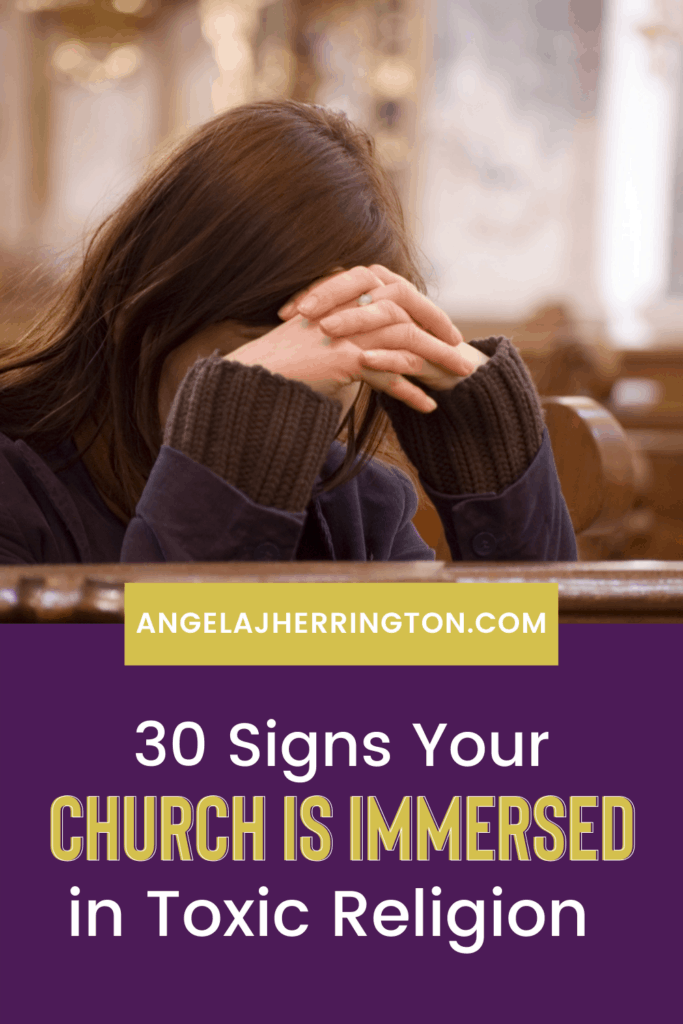Have you ever wondered if your church is immersed in toxic religion? Do you have a nagging feeling that something is off or wrong, but you can’t put your finger on it?
Sometimes, churches can be unhealthy and oppressive, and attending will do you more harm than good.
The number one reason women walk away from the church is because of #churchhurt (and we aren’t talking about getting our feelings hurt during minor spats). The women I work with talk about the pain of spiritual abuse, neglect, and horrific false teachings that pushed them away from God.
When it comes to your faith, the last thing you want is to feel like you’re suffocating under the weight of legalism or fighting off racism, misogyny, and hate. BUT when you’re deeply embedded in the community, it can be challenging to see the warning signs. It’s much easier to see harmful behaviors from the outside; that’s why I created this post for you.
I even created a printable version of this article. You can grab it here.
Let’s walk through 30 signs that will help you identify whether the church you attend is toxic.
If any of these thirty signs sound familiar, then maybe it’s time to find a new, healthier faith community:
- People make fun of other churches, religions, or lifestyles when they are around your church. Being mean spirited is a sign of rotten fruit.
- Your friends are the only people you can talk to about your doubts. Asking questions about what your church believes and teaches isn’t welcomed.
- Your pastor/teachers are more interested in preaching conservative political agendas than teaching what scripture says. Deconstructing toxic religious culture, white supremacy, and patriarchy is not an option.
- Your pastor/teachers think that if you don’t have the “right” answers to their questions, there’s no point in talking any further. They aren’t interested in having a broad conversation that leaves room for interpretation of long-held doctrine.
- There is a lack of diversity in the church’s leadership and membership. Everyone looks and believes the same. There’s no one from different cultures, ethnicities, perspectives, or sexual orientations, etc.
- You feel like you’re always walking on eggshells and can’t speak your mind without being punished for it. Inclusion in the church community is withheld from those who speak up, sometimes including outright shunning from other church members.
- People are afraid to voice their opinions because they’re worried others will judge them. Those who don’t toe the line are ostracized, both implicitly and explicitly, for voicing concerns with the church’s beliefs.
- People are being abused in any way, whether physically, sexually, spiritually, or emotionally. These types of abuse are usually hidden from the church members and the larger community. Anyone who dares to speak up about them is a target for further abuse.
- You’re only allowed one opinion on certain topics (i.e., you can’t disagree with your pastor). Disagreement is viewed as rebellion, backsliding, trying to divide the congregation, etc.
- You never hear about Jesus’ absolute love for people who hold different beliefs (even within Christianity). Instead, you’re taught to “hate the sin, love the sinner.”
- People gossip about and backbite each other, but no one confronts them. Accountability for one’s actions is more of a buzz phrase than authentic practice.
- You are required to be a member of the church to participate in certain activities.
- Women are not allowed to preach at any time, even if they have been doing so for decades, and their preaching has impacted thousands of people’s lives. Instead, they are designated solely for women’s ministry roles: nursery worker, children’s ministry director/worker, women’s bible study leader, etc.
- The pastor is more concerned with money than the needs of the congregation. Perhaps the pastor lives lavishly off church donations, yet those who need help the most go without basic resources.
- There’s an unspoken rule that you should never question what goes on in the church. Again, to do so would be considered rebellious and divisive. You must trust that the leadership knows best for the congregation.
- The people who attend are not being fed spiritually but are just going through the motions. There’s a false sense of authenticity and vulnerability but peopel are holding back.
- You’re discouraged from talking to others about your struggles and doubts because “God will work it out” or “you just need to pray more.” This approach is spiritual bypassing and perpetuates a feeling of always needing to earn one’s salvation and belonging in the community.
- Church members don’t seem to care for one another as they should. When you need help, no one shows up. When you want to help others you’re discouraged from it if they’re not an insider.
- The church promotes “purity culture,” which is both unrealistic and unhealthy. Females are held responsible for the thoughts and actions of the males around them. Sexual identity and health are not discussed positively.
- The pastor and staff are not paid a living wage. Financial concerns such as health insurance and retirement funds are nonexistent.
- Staff is underpaid, overworked, and unappreciated. They are expected to sacrifice their own needs to “further the ministry.”
- There’s no transparency about finances or salaries.
- There’s an unhealthy power dynamic. Power is never good in and of itself. Power without love leads to abuse; love without power leads to passivity; and power without the spirit leads to oppression.
- People who have left the church aren’t willing (or able) to talk about their experience or reason for leaving. There’s a sense of “hush-hush” protection regarding what happens within the church walls.
- Leaders are more concerned with the church’s reputation than the spiritual health of its members. Image is everything and protected at the cost of congregants’ spiritual growth.
- Church leaders tend to be defensive when challenged about their decisions. They often claim that “they are doing what God called them to do.” and dodge legitimate questions.
- The church is not welcoming to new people or different types of people. It’s not even welcoming to people deconstructing from toxic religion and trying to heal the wounds and recover from church hurt.
- The leadership talks down on other churches and denominations as less “right” in God’s eyes. The leadership is critical, condescending, and abusive.
- People feel like they can’t voice their opinions without fear of repercussions from leadership. When deconstructing from toxic religion, you tend to see things very differently than your toxic family members. You start to notice things that others brush over without a second thought or want to share how you are deconstructing your faith with others but fear repercussions from leadership or family members.
- People are treated like projects to be completed instead of human beings with intrinsic value that’s not related to what they can or cannot produce at this moment. The higher authority who dictates what is considered righteous or acceptable behavior often has a lot less compassion than one might think.
If several or all (YIKES) of these thirty signs sound familiar, then it’s probably time to find a healthier faith community.
I know how hard it can be to leave a toxic faith community, but I also know that your mind, body, and soul will thank you for making this hard decision.
Sometimes it’s necessary to take a step back from church altogether while you heal from #churchhurt. I wrote an entire post about that here to help you give yourself permission to take a break.
Whether you’re hopping right into a new church or taking a break, I encourage you to check out The Faith Deconstruction Café.
This free online support group is a community packed with resources, encouragement, and tips on deconstructing your faith from toxic religion. It’s a great place to process what you’re going through and connect with like-minded people.
Don’t forget to grab the printable version of this article here!

Angela is a Faith Deconstruction Coach and host of The Deconstructing Faith Summit who helps people break free from toxic religious culture & empowers them to recover from #churchhurt. She has led online ministries for a decade, enjoys working with clients 1:1, in groups, and is a dynamic conference speaker. She’s a Lark’s Song Certified Life Coach who reaches thousands of people in 40+ countries each month on Facebook, IG, Twitter, Pinterest, and her blog.
She’s a firstborn, Enneagram 8, Gen Xer who loves to question everything. She holds a BA from Indiana Wesleyan and a Masters in Leadership from Wesley Seminary. Her graduate research project focused on leadership development and opportunities for Gen X women in the US church.
Angela and her unique online ministry are featured in Lyz Lenz’s 2019 book God Land: Story of Faith, Loss, and Renewal in Middle America. She has published articles in Hope for Women and HOPE is Now magazines. She has been featured in The New Republic, Publisher’s Today, and Religion News Service.
Her first book, Deconstructing Your Faith Without Losing Yourself, Will be published by Eerdmans in February 2023.
Angela is also a wife, mom to 5, and a proud resident of Marion, Indiana with her family when they’re not traveling the US in their RV.








